PML Applications’ Sam Fawcett will present at this year’s Carbon to Sea Annual Convening in Washington, D.C. (19th – 21st May 2025).
The annual event, hosted by CTS (Carbon to Sea), gathers key practitioners working on ocean alkalinity enhancement (OAE) – a method of marine carbon dioxide removal (mCDR). Now in its third year, the Carbon to Sea Annual Convening is gathering OAE leaders from all over the world to discuss the latest research.
Sam, who is Manager of the PML Applications’ Centre for Coastal Technologies explained his role at the event:
“I’ll be introducing a new first-of-its kind framework to the attendees and going through some of the early decision-making process. This will be at a workshop within the event and as part of the poster session, so plenty of opportunity to find out more.
We [CCT] are the lead authors for the framework and we are going to use the workshop and poster session as an opportunity to get feedback from the community.
The framework is a best practice guide for environmental monitoring when doing OAE field trials. It’s essentially a guided set of instructions that can be used by people conducting field trials as well as regulators as a basis for ensuring the environmental safety of the operation.
The framework breaks down into four stages that can be used depending on where you are with your operation. These range from pre-trial planning through to continuous dosing of alkalinity.
It represents a first-of-its-kind guidance for OAE practitioners for environmental monitoring. As increasing numbers of field trials are being planned and starting to happen, it is important to have environmental guidance that balances the need for speed on climate restoration with the necessity for environmental safety when doing so.”
Sam will be joined for this workshop by fellow OAE experts to introduce the environmental monitoring framework that has recently concluded the first stage of the review process. The main focus of the workshop is advancing responsible approaches to ocean alkalinity enhancement field trials. Participants will be exploring key points of contention and ambiguity raised during the first review to delve into complex issues via open dialogue. The second segment of the workshop involves a collaborative scenario testing exercise to explore environmental impact and engage in discussion around potential mitigation strategies.
Sam added: “I’m looking forward to networking with other scientists and professionals who work in mCDR and am also interested in hearing their feedback on the framework, as it is the first time I am presenting it to a wider audience. If you are going to be at the event, please reach out on LinkedIn or at the event to connect.”
For more information on mCDR, and the research and services at PML Applications, please reach out directly.
Sam Fawcett
Email: saf@pml.ac.uk
LinkedIn: @sam-fawcett95



